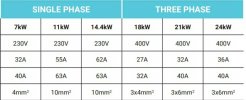Black Hole
May contain traces of nut
Coincident with the announcement of grants for heat pump heating systems, my gas combi boiler has been declared beyond economic repair (radiators seem OK, but it's struggling to supply consistent hot water). Granted it's over 20 years old, but I threw £1400 at it for a major rebuild less than 5 years ago. This puts me right at the spearhead (when I prefer to be behind the curve - let other people be guinea pigs).
I shall be getting a second opinion on the boiler, but...
Input/discussion welcome.
I shall be getting a second opinion on the boiler, but...
Replace: Moderately expensive; relatively quick and easy; not future-proofed; subject to gas price hikes.
Air-sourced heat pump: Very expensive; significant engineering and adaptations required; high-maintenance.
Ground-sourced heat pump: Enormously expensive; significant engineering and adaptations required; high-maintenance; probably not enough space available for the necessary groundworks; opportunity to replace the patio.
Per-room heat/cool aircon: Noisy, and I guess expensive to run.
Electric combi boiler (is there such a thing?): Quick and easy; expensive to run?
Electric hot water (reinstall hot cylinder system?) + electric rads/heaters: Least maintenance! No more corroding radiators, thermostatic valves, diverters, circulators... Can add roof-mounted solar collectors to heat a hot cylinder at later date.
Input/discussion welcome.


 )
)